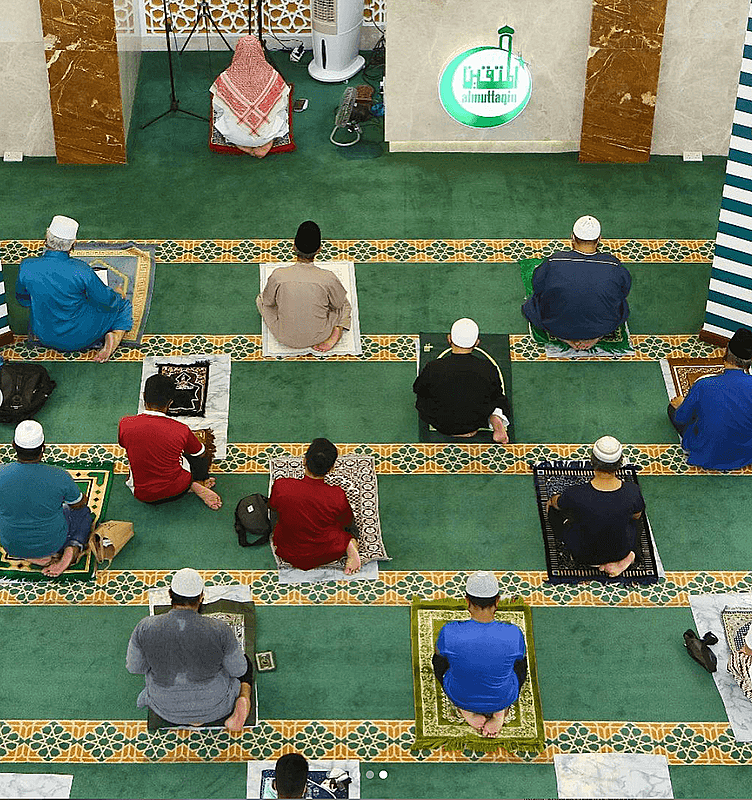4 Ways to Internalise the Essence of Fasting
4 Things To Know About Ramadan Fasting Month

Ramadan is a special month for Muslims. It is the month we seek to increase our spirituality and get closer to God. Fasting marks a significant act of worship that defines the month-long spiritual experience. However, beyond abstaining from thirst and hunger from dawn to dusk, what exactly is the significance of fasting?
In this article, we break down four ways to internalise the essence of fasting in Islam and the significance of Ramadan.
1. Fasting is not a uniquely Muslim tradition
The act of fasting practised by Muslims worldwide is, in essence, a practice that is neither unique nor exclusive to Islam. In ordaining Muslims to fast, God had described that, indeed, this act of fasting had been practised by the people of the other traditions. Muslims believe that fasting had been prescribed to the followers of the previous Prophets, including the people of Noah, Moses, Jesus (peace be upon them) and others a.s.
Allah s.w.t says in the Quran,
يَا أَيُّهَا الَّذِينَ آمَنُواْ كُتِبَ عَلَيْكُمُ الصِّيَامُ كَمَا كُتِبَ عَلَى الَّذِينَ مِن قَبْلِكُمْ لَعَلَّكُمْ تَتَّقُونَ
”O believers! Fasting is prescribed for you—as it was for those before you—so perhaps you will become mindful (of Allah)”
(Surah Al-Baqarah, 2:183)
Fasting is indeed a shared tradition in the history of human civilisation. It is a practice we Muslims share with other spiritualities and religions. Different religious traditions manifest the act of fasting differently. It generally differs on the duration of fasting and on what an observant religionist can do or cannot do while fasting. However, what is common to a fasting person is the act of abstaining from something for a specific duration, as defined in his or her religious tradition.
2. Fasting is not just abstaining from food and drinks
Not even water? Often, as Muslims, we are being asked that question. The answer is yes; we cannot even drink while fasting. However, the act of fasting is beyond abstaining from food and drink from dawn to dusk. Fasting is beyond observing physical abstention. A fasting person is reinforced to refrain from saying anything hurtful or non-beneficial. For instance, Muslims must not speak ill, spread lies or even pass unnecessary comments.
In today’s digital age, the online world may lead us to do things that may affect our fasting. Therefore, we need to exercise self-restraint, both online and offline. Refrain from being preoccupied with unnecessary matters and affairs that have nothing to do with us. We should only provide positive comments; silence should be our default action if we have nothing beneficial to share and express. The Prophet s.a.w. reminded us that,
مَنْ كَانَ يُؤْمِنُ بِاللَّهِ وَالْيَوْمِ الآخِرِ فَلْيَقُلْ خَيْرًا، أَوْ لِيَصْمُتْ
“He who believes in Allah and the Last Day must either speak good or remain silent.”
(Sahih Al-Bukhari)
In observing our fast, we are also required to control our anger.
Indeed, fasting is hence a test of patience and emotional endurance. It requires us to recognise our limits with humility and to change ourselves for the better.
Read: Rules of Fasting in Islam
3. Fasting has its social dimension
The act of fasting also includes the social dimension, besides improving and benefiting oneself inwardly. Fasting should lead one to strengthen our relations with others. In the fasting month of Ramadan, meals are shared, and family, friends and neighbours gather for iftar together (breaking of the fast). It is an opportune moment to forge new relationships and friendships and strengthen existing ones.
Source: Md.Faizal Redknapp.Ishak on Facebook
Islam emphasises that a good Muslim is a good neighbour. Muslims are thus commanded to maintain a good neighbourly relationship. The more affluent among us are encouraged to share food with our neighbours, and it is during the month of Ramadan that this practice is being reinforced. Being aware of our neighbours’ well-being and welfare is a commendable act.
This is, in fact, our enduring endeavour as Muslims to follow the footsteps of Prophet Muhammad s.a.w., whom we regard as the paragon of virtues and morality. In one of the sayings of Prophet Muhammad s.a.w., he mentioned that
مَنْ كَانَ يُؤْمِنُ بِاللَّهِ وَالْيَوْمِ الآخِرِ فَلْيُحْسِنْ إِلَى جَارِهِ
“Whoever believes in God and the Last Day should treat his neighbours well.”
(Sunan Ibn Majah)
We are called to do good to our neighbours regardless of their religious and ethnic backgrounds.
In the month of Ramadan especially, when rewards for good deeds are being multiplied, Muslims are encouraged to make charitable contributions to the less fortunate and the needy. During Ramadan, Muslims strive to seize the opportunity to radiate compassion to humanity. As proactive members of society, we are thus reminded in this month not to forsake the plight of the less fortunate and the needy. We are told to show care and concern, share and empathise. There are endless opportunities to do good this Ramadan.
Read: 5 Good Deeds To Do This Ramadan
4. The fasting month is a spiritually energizing month
The month of Ramadan, the month when Muslims fast during the day, and increase prayer during the night, is, in essence, a month that calls for Muslims to rethink our day-to-day conduct. A month of discipline, a month that serves as an annual training period to reinforce good behaviours and exemplary conduct. It is also a month that we identify as the month of mercy and forgiveness. A month that provides opportunities for spiritual enhancement. A month of deep devotion and reflection.

Ramadan is the only month when the special tarawih prayers are observed every night. It is also the month we increase our qiyam (late-night prayers).
Read: Guide to Qiyamullail - What, Why and How To Perform It
Ramadan is also a month that is closely associated with the Quran. After all, the first of the final revelations to humankind was revealed in the month of Ramadan. We use the opportunity of this sacred month to recite the Quran more than in any other month. Beyond reciting, Quran is a scripture that calls for us to internalise its meanings and practice its values. Therefore, we should take this opportunity to get close to our sacred text and ponder upon its messages and manifest them in our lives today.
Allah s.w.t. says in the Quran,
لَوْ أَنزَلْنَا هَذَا الْقُرْآنَ عَلَى جَبَلٍ لَّرَأَيْتَهُ خَاشِعًا مُّتَصَدِّعًا مِّنْ خَشْيَةِ اللَّهِ وَتِلْكَ الْأَمْثَالُ نَضْرِبُهَا لِلنَّاسِ لَعَلَّهُمْ يَتَفَكَّرُونَ
Had We sent down this Quran upon a mountain, you would have certainly seen it humbled and torn apart in awe of Allah. We set forth such comparisons for people, so perhaps they may reflect
(Surah Al-Hashr, 59:21)
This blessed month of Ramadan is also a month where we forgive and get closer to one another. It is also a month when we Muslims seek forgiveness from Almighty God for all our wrongdoings and humble ourselves before Him as His servant, in our service to humanity.
Ramadan is indeed a month that provides splendid opportunities for spiritual enhancement and social upliftment. It is a month of renewal, a month of transformation, and a month of resolution. May Allah s.w.t. bless us with the rahmah (mercy) of Ramadan, and may we be among His servants to spread this rahmah to others. Amin.
And Allah knows best.

